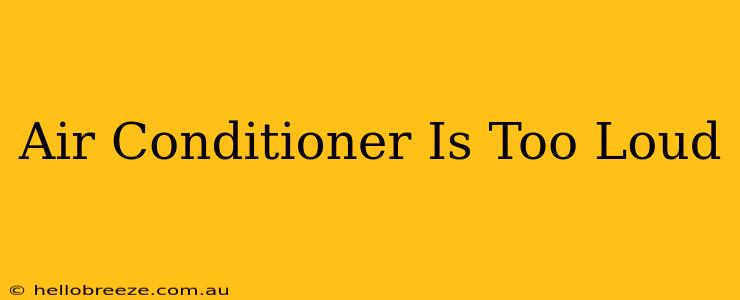Is your air conditioner making more noise than a rock concert? A noisy AC unit can be incredibly frustrating, disrupting sleep, conversation, and overall peace of mind. Fortunately, many common causes of excessive AC noise are easily diagnosed and fixed. This guide will walk you through troubleshooting why your air conditioner is too loud and offer solutions to restore tranquility to your home.
Identifying the Source of the Noise
Before diving into solutions, pinpoint the source of the racket. Is it a high-pitched whine, a low rumble, a rattling sound, or something else entirely? The type of noise often indicates the problem area.
Common Noises and Their Causes:
- High-pitched whine: This often points to a problem with the compressor motor, fan motor, or electrical components. A failing capacitor is a common culprit.
- Rumbling or groaning: This could indicate loose parts, worn bearings in the fan motor, or issues with the air handler.
- Rattling or banging: Loose blower housing components, ductwork issues, or objects obstructing the fan blades are likely culprits.
- Hissing sound: This usually means there's a refrigerant leak. This is a serious problem and requires professional attention immediately.
Troubleshooting Steps for a Noisy AC Unit
Let's tackle some of the most frequent reasons why your air conditioner is too loud:
1. Check for Obstructions
- Clear the area around the outdoor unit: Ensure nothing is blocking the airflow, such as leaves, debris, or overgrown plants. Proper airflow is crucial for efficient and quiet operation.
- Inspect the indoor unit: Make sure nothing is obstructing the air vents or the blower fan.
2. Examine the Fan Blades
- Inspect for damage or debris: Bent or damaged fan blades create imbalances, leading to excessive noise and vibration. Carefully inspect both the indoor and outdoor unit's fan blades.
- Clean the blades: Gently clean the fan blades to remove accumulated dust and dirt.
3. Tighten Loose Parts
- Check all screws and bolts: Over time, vibrations can loosen screws and bolts, leading to rattling and buzzing. Tighten any loose fasteners on the indoor and outdoor units.
- Ensure proper mounting: Verify that the AC unit is securely mounted to its base or wall. Loose mounting can cause significant vibration.
4. Lubricate Moving Parts (with caution!)
- Consult your AC manual: Some AC units require periodic lubrication of specific parts. Always refer to your owner's manual for specific instructions and recommended lubricants. Never lubricate parts that shouldn't be lubricated, as this can damage the unit.
5. Address Ductwork Problems
- Check for leaks and loose connections: Leaky or poorly sealed ductwork can create significant noise. Listen carefully near your ductwork for any unusual sounds.
- Professional assistance: If you suspect ductwork issues, it's best to consult a professional HVAC technician.
When to Call an HVAC Professional
While many noise issues are easily solved, some require the expertise of a qualified HVAC technician. Call a professional immediately if you notice:
- Refrigerant leaks (hissing sounds)
- Unusual smells
- Continuous loud noises that persist after troubleshooting
- A significant decrease in cooling efficiency
Ignoring significant noise problems can lead to further damage and potentially costly repairs down the line. Regular maintenance, including professional inspections, can help prevent many noise-related issues. A quiet, efficiently operating AC unit is essential for a comfortable and peaceful home.

